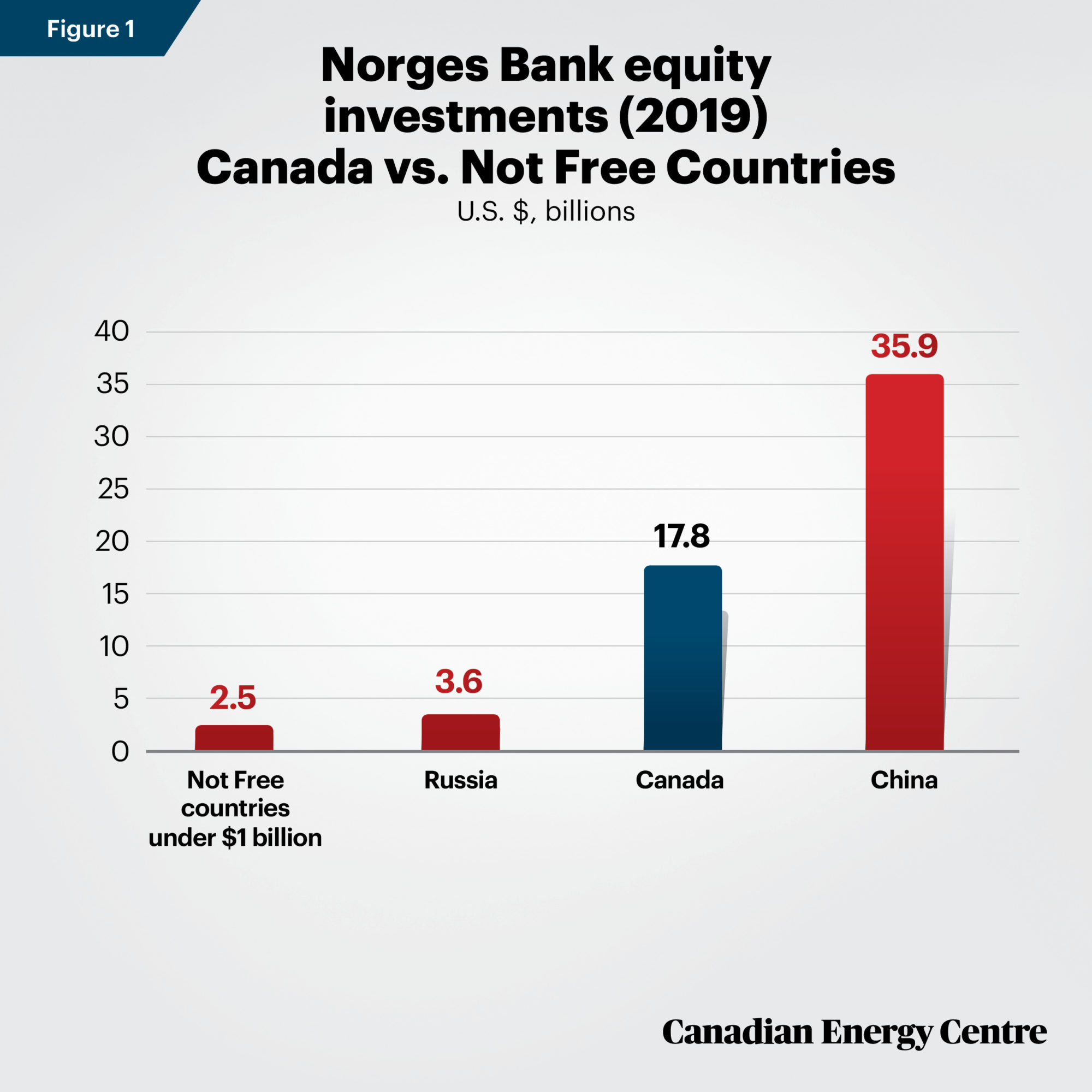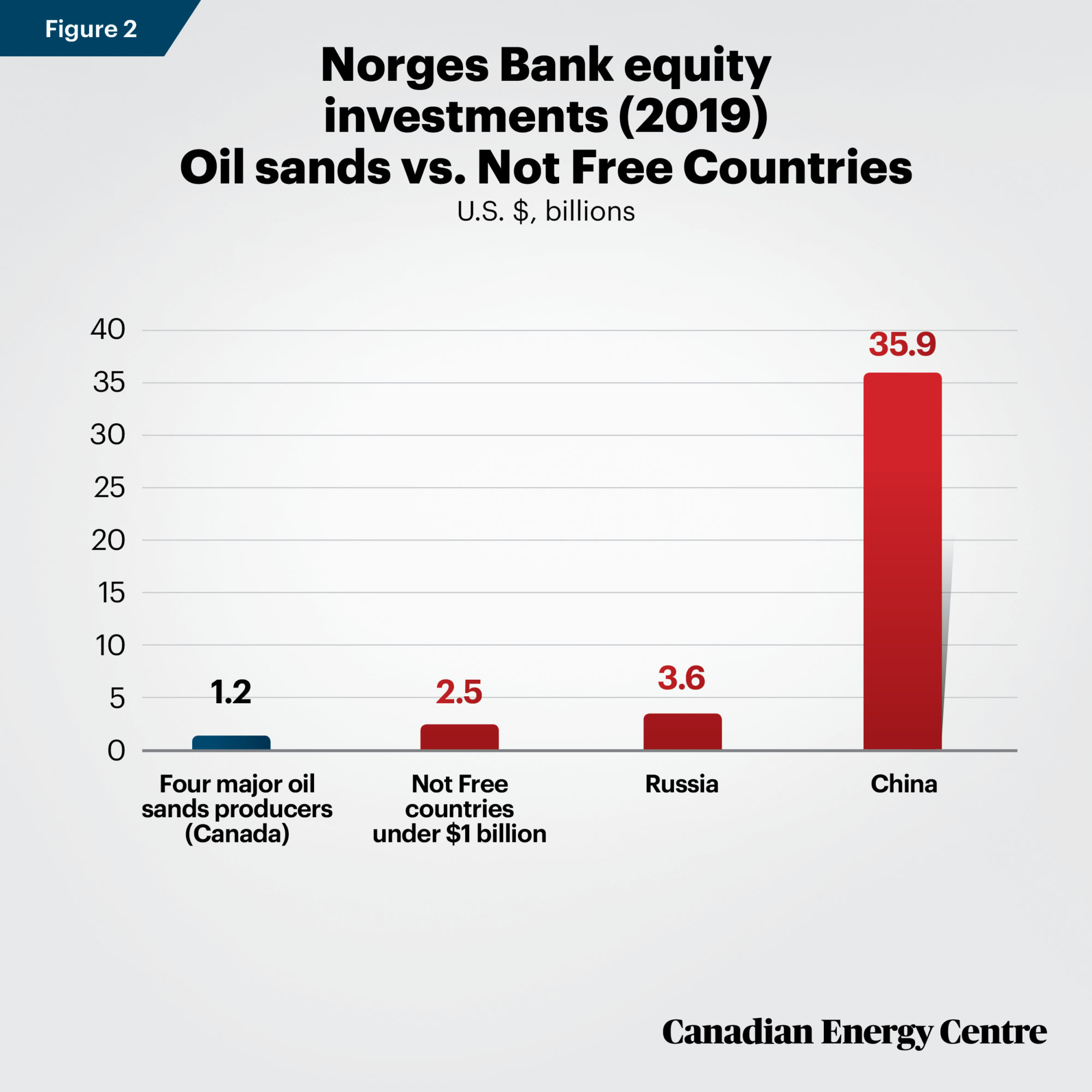Updated by Mark Milke and Ven Venkatachalam on May 15, 2020
Follow CEC on Linkedin CEC Linkedin
Follow CEC on Facebook CEC Facebook
Follow CEC on Twitter CEC Twitter

Johan Sverdrup field, Norway, August 2019. Photograph by Ole Jørgen Bratland, Equinor
Norway’s investments in autocracies and dictatorships are twice its investments in Canada
Norges Bank, which holds investments resulting from oil revenues over the decades in Norway, recently announced its plan to divest from energy companies with holdings in Canada’s oil sands. This Fact Sheet (which can be downloaded here as a pdf) adds up Norges Bank holdings in Canada in total. Using rankings from Freedom House, a Washington D.C.-based think tank which has measured and ranked countries and territories by their degree of freedom since 1973¹, it then compares Canada (ranked Free) and holdings in major oil sands companies with Norges bank holdings in Not Free countries.
Ethical investing guidelines and ethical double standards
Critical freedoms measured by Freedom House include civil liberties, political pluralism, the rule of law, freedom of expression and belief, political rights, personal autonomy and individual rights. Norges Bank has justified its exclusion of Canadian oil sands companies that emit carbon emissions, based on its Council of Ethics recommendations. Norges Bank has thus turned a technological challenge—reducing carbon emissions—into a moral and ethical matter, while it concurrently continues to invest in nations that rank poorly on multiple freedom measurements, freedoms that Norwegians and Canadians take for granted.
Thus, we note that Norges Bank investments include the following countries:
- Saudi Arabia, where Transparency International notes that “almost total opacity in public accounting prevents ordinary Saudis from understanding how much of the state income generated by massive oil revenues ends up as private wealth for the royal family and its clients”; where a 2019 United Nations commission that investigated the murder of a Saudi Arabian journalist in Turkey, Jamal Khashoggi, concluded that his murder “constituted an extrajudicial killing for which the State of the Kingdom of Saudi Arabia is responsible”; and where Freedom House notes the country’s “absolute monarchy restricts almost all political rights and civil liberties” and gives Saudi Arabia a score of ‘1’ out of 40 on political rights and 6/60 on civil liberties.
- Russia, where Freedom House reports that “Power in Russia’s authoritarian political system is concentrated in the hands of President Vladimir Putin” and where “ the Kremlin is able to manipulate elections and suppress genuine dissent. Rampant corruption facilitates shifting links among bureaucrats and organized crime groups.” Freedom House gives Russia a score of ‘5’ out of 40 on political rights and 15 out of /60 on civil liberties.
- China, where Freedom House notes that “China’s authoritarian regime has become increasingly repressive in recent years. The ruling Chinese Communist Party (CCP) is tightening its control over the state bureaucracy, the media, online speech, religious groups, universities, businesses, and civil society associations,” and gives China a score of ‘-1’ out of 40 on political rights and 11 out of /60 on civil liberties.
Norges Bank equity holdings in Canada vs. Not Free countries Figure 1 compares Norges Bank equity holdings (as of 2019 and in U.S. dollars) in Canada, which is designated Free by Freedom House, with Not Free countries in which Norges Bank also invests.
Norges Bank has equity investments of:
- $3.6 billion in Russia
- $17.8 billion in Canada
- More than double that in China at $35.9 billion
- Other Not Free country investments include Bahrain ($39 million); Oman ($51 million); Qatar ($84 million); Saudi Arabia ($415 million); Vietnam $479 million; Egypt ($530 million); and United Arab Emirates ($888 million). These other countries account for $2.5 billion in Norges Bank equity investments in Not Free countries in addition to China and Russia.
1. Freedom House’ definition of freedom and system of rankings is available on its website at About Us.

Sources: Norges Bank and Freedom House
Norges Bank ending $1.2 billion in oil sands; keeping $42 billion in autocracies
Figure 2 shows the Norges Bank equity investments as of 2019 in four Canadian oil sands majors vs. other Norges Bank investments worldwide in Not Free countries.
- The four Canadian oil sands majors are Imperial Oil ($97.8 million), Cenovus ($102 million), Canadian Natural Resources ($380 million), and Suncor ($578 million) or nearly $1.2 billion in total.
- In contrast, Norges Bank had equity investments in Not Free countries in 2019 that included Saudi Arabia ($415 million), Egypt ($530 million); United Arab Emirates ($888 million) and much higher amounts invested in Russia ($3.6 billion) and China ($35.9 billion).
- Norges Bank is thus ending its $1.2 billion investment in Canada’s oil sands but retaining $42 billion in equity stakes in autocracies.

Sources: Norges Bank and Freedom House
The SNC-Lavalin oddity for Canadians
Of relevance to ethical investing in Canada in addition to the foregoing, Norges Bank also has an equity investment in SNC-Lavalin Group Inc. In late 2019, a division of SNC-Lavalin Group Inc pleaded guilty to fraud, related to activities Libya and paid a $280 million fine. As of 2019, Norges Bank had a $44.8 million equity investment in SNC-Lavalin Group Inc.
Takeaway: Norges Bank is ignoring longstanding ethical standards
The plan by Norges Bank plan to divest from energy companies with holdings in the oil sands is based on categorizing carbon emissions as an “ethical” issue as opposed to a technological challenge to be solved. In so doing, and as Norges’ own investment decisions indicate, it looks to have ignored the longstanding, obvious ethical issues that implicitly exist with investments in countries such as Russia, China, Saudi Arabia and others ranked as Not Free and whose injuries to civil and political rights are a matter of record.
About the Canadian Energy Centre (CEC)
The Canadian Energy Centre (CEC) is an independent provincial corporation that is primarily supported by the Government of Alberta’s industry-funded Technology, Innovation and Emissions Reduction (TIER) fund. The CEC’s mandate is to promote Canada as the supplier of choice for the world’s growing demand for responsibly produced energy. At its core, the CEC will also create a new, pragmatic, fact-based narrative about Canadian energy.
Notes
This CEC Fact Sheet was compiled by Mark Milke and Ven Venkatachalam at the Canadian Energy Centre: www.canadianenergycentre.ca. Image credit ‘Johan Sverdrup field’ by Ole Jørgen Bratland from Equinor.
Sources: (Links live as of May 14, 2020)
Freedom House (2020). Countries and Territories: Global Freedom Scores. <https://bit.ly/2yS1IPf>; Freedom House (undated). About Us. <https://bit.ly/2YC53g5>; Freedom House (2020). China. <https://bit.ly/3cAB8Ja>; Freedom House (2020). Russia. <https://bit.ly/2AkZGrp>; Freedom House (2020). Saudi Arabia <https://bit.ly/2T7pwFQ>; Norges Bank (2019). <https://bit.ly/2y2yJYX>; Norges Bank (2020). “Government Pension Fund Global: Exclusion and observation decisions.” <https://bit.ly/35YBK97>; Osler (2020). “Turning the Page? SNC Pleads Guilty to Fraud Relating to Libya Work; Former Executive Sentenced for Fraud, Corruption.” <https://bit.ly/3fLvAOh>; Transparency International (2020). Saudi Arabia, <https://bit.ly/2AwBNgV> United Nations Human Rights Council (2019). <https://bit.ly/3bxQsVy>.
Creative Commons Copyright:
Research and data from the Canadian Energy Centre (CEC) is available for public usage under creative commons copyright terms with attribution to the CEC. Attribution and specific restrictions on usage including non-commercial use only and no changes to material should follow guidelines enunciated by Creative Commons here: Attribution-NonCommercial-NoDerivs CC BY-NC-ND.
Share This:





 CDN NEWS |
CDN NEWS |  US NEWS
US NEWS 

































Canada’s Advantage as the World’s Demand for Plastic Continues to Grow